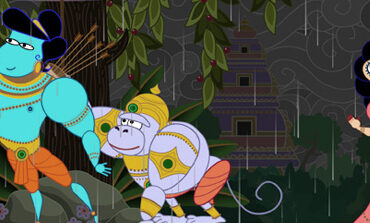Once there was a Fake I.P.L. Player. He wrote funny anecdotes about the Indian Premier League (I.P.L.) on his blog and was an Internet celebrity during I.P.L. Season Two. He became the mighty messiah of online India with his jokes and nicknames (oh, come on, ‘Vinnie Dildo’ had us all secretly in splits).
He made India laugh for a while, made Sreesanth famous for something other than being slapped by Harbhajan, and probably called the who’s who of cricket the choicest of names, before fading or being found out. After I.P.L. Two ended, irrelevance happened to Fake I.P.L. Player (F.I.P.). So, F.I.P. sought to make the most of his dying legend with a book. Thus came The Gamechangers.

The Gamechangers book cover; courtesy of HarperCollins India.
If you have trouble with the acronyms in this review, you’re in deep shit if you head on to read the book. The sheer number of capital letters as well as the nicknames assigned to thinly veil the real or intended names of the people referred to is sure to get your head spinning.
Statutory Warning: Get your black book out, and prepare a ready-reckoner to keep track of the nicknames. The book starts looking like your friends list on poor old Orkut after a while.
Before I get into reviewing the book, it’s important for readers to understand how the book falls flat on its face, with its stand as an extension of the Fake I.P.L. Player blog. The blog was a hit with the people because it was irreverent and funny, and even though not everyone took it seriously, it provided some much needed comic relief, what with the I.P.L. being shifted out of India and all the political and financial connotations that went with it. It was more about being funny and politically incorrect about cricket, a subject close to Indian hearts. Everyone took it with a pinch of salt, indulged in water-cooler discussions about it, and then, as the Royal Challengers Bangalore won I.P.L. Two, pretty much forgot about it.
Until the book came along.
Building on the popularity of the blog, Fake I.P.L. Player comes out with a whole new web of conspiracy theories in his book. The book hails the F.I.P. as the all seeing, all knowing mole in one of the I.P.L. teams. It goes further in trying to establish F.I.P. as the bête noir of I.P.L.’s top brass, especially the Commissioner, a Bollywood-superstar-turned-team-owner, a flamboyant multibillionaire franchise owner, and some of the players who had much to owe to the I.P.L.
The Gamechangers starts off with the first post from the Fake I.P.L. Player’s blog, and charts the course from day one to day 35 of the tournament, detailing compromising situations, but with nicknames forming a convenient veil to get the author out of any legal tangles. Interspersed with posts from the blog, the book details the debauchery and dispensable morals of the team owners, administration and players at I.P.L., going through sex scandals involving Shaun Vaughney (guess who that was), Frank Stein — a South African fast bowler with his nose up all the wrong powders, Abhimanyu Singh — the dapper prince of Indian cricket, and his exploits, both on and off the field. Special praise is reserved for the I.P.L. team from Kolkata and their supposedly megalomaniac owner, laptop-loving coach, spineless foreign captain, racist support staff and the darling of the masses, a spoilt brat of an ex-India captain.
Not much needs to be written about the book itself, which celebrates the lowbrow literature that recent Indian writers have come to epitomise. The book pans out like a masala-Indian movie, with no real substance running through the 390-odd pages of the book. Quite frankly, the only real amusing parts of the book are when the author goes into overdrive about the impact of the Fake I.P.L. Player blog, describing it as the toast of India and the most talked about thing during I.P.L. Two. Reality check here for the author: The blog was brilliant, no doubt about it, but it was just that — a blog; a fling with technology catching the fancy of a nation with chronic A.D.D. The book tries to recreate the same, but fails miserably, mostly because of the unimaginative plots, the pedestrian language, and run-of-the-mill romance. The book is not half as offensive or stimulating as the blog, and the feeling of a refreshing change from the cricket-related jargon that fans are subjected to day in and day out is lost. The author really isn’t funny except for the part where he refers to S.R.K.’s director/boyfriend in a yellow tank top and ultra-short shorts.
The Gamechangers also introduces a brand new player in the F.I.P. saga — Detective P.M.S., who is put in charge of investigating the case by the head honcho of the I.B.L. (as the I.P.L. is referred to in the book). P.M.S., when asked by the head of the I.B.L., makes finding the F.I.P. his only and sole purpose in life. This is interesting because P.M.S. is clearly a master of his trade. P.M.S. has an office on Great Portland Street in London, visits 221B Baker Street as homage before starting a case, and tells us about his beginnings in India working for the deep and dirty back home. Strangely though, there’s never a mention of, I don’t know, his parents or family. Except for his stereotypical Watson-like, Indian I.I.T. hippie boyfriend, the author forgets to add a social life to P.M.S. Not that P.M.S. is remotely Holmes-esque. He’s more of a Clousseau, without the accent. The bumbling detective tries to build up suspense about the case in his part of the narrative, but ends up looking stupid and getting wet in the rain.
The book deals with the same old, same old of megalomanicas, mudslinging and the manic high-life on the Bollywood/cricket circuit. Reminds you of watching one of those K-serials really, only this time, it’s followed by a reality show too.
There are a few things that needed to be addressed as this book is unleashed on the reading Indian. Where are the great writers of India-past? Is this it — our great second generation of Indian English authors? This book just adds to the un-illustrious list of Chetan Bhagat and his recent work, the guy who wrote Keep Off the Grass, and other such bad writers of college life accounts. It makes one wonder if these should have made it out of their authors’s respective private journals.
Going back to the blog while reading the book is a necessity, since the book keeps praising the blog sky-high. Make no mistake, the Phantom of the Opera quote at the beginning is just to throw you off. The book is an unimaginative, crap-tastic, crowd-pleasing rip-off authored by someone high on too many bad ’80s Bollywood flicks.
[HarperCollins India; ISBN 978-81-722-3855-1]








The review has covers most of it but could have been better organized (by your standards).
–AM
It's the curse of the 100 rupee novel.